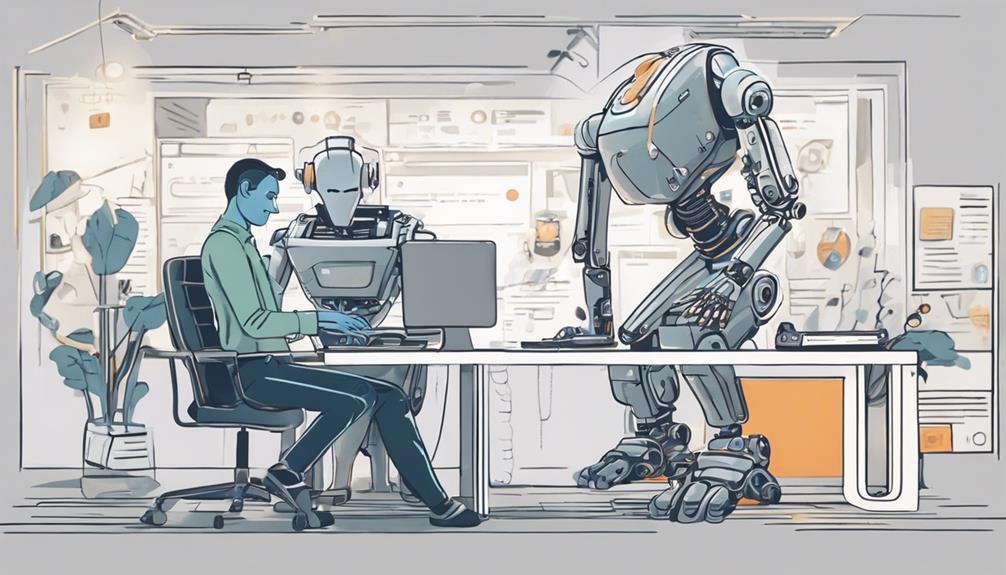Meta’s decision to cut 600 roles in its AI unit signals a strategic shift toward more focused and ethically responsible AI development. This move suggests the company wants to prioritize core projects and guarantee ethical standards while reducing expansion plans. You might notice changes in how Meta approaches innovation and talent management, reflecting its efforts to balance progress with societal responsibilities. Stay with us to explore what this restructuring means for the future of AI at Meta.
Key Takeaways
- The layoffs indicate Meta’s shift toward more focused and responsible AI development strategies.
- Reducing AI talent may slow innovation but aims to prioritize ethical oversight and societal value.
- The restructuring reflects a move away from aggressive expansion toward sustainable, ethical AI initiatives.
- Talent retention is critical to maintain ethical standards and ongoing responsible AI projects amidst organizational changes.
- Overall, the restructuring signals Meta’s recalibration to balance innovation with responsible and ethical AI practices.

Meta has announced it will lay off 600 employees in its artificial intelligence unit, as part of a broader restructuring effort. This move signals a shift in how the company is approaching its AI ambitions and raises questions about its commitment to responsible AI development. When a company cuts such a significant portion of its AI workforce, it’s natural to wonder how this impacts not only innovation but also the ethical standards guiding its AI projects. You might think that reducing talent could compromise AI ethics, but Meta’s leaders likely see this as a way to streamline operations and focus on core priorities. Still, talent retention becomes a critical concern here—retaining skilled AI researchers and engineers is essential for maintaining ethical standards and ensuring responsible AI deployment.
By downsizing its AI team, Meta sends a clear message about its strategic priorities. It suggests that the company might be shifting away from aggressive expansion to a more measured, possibly more ethical, approach. When talent leaves or is let go, it can be challenging to uphold AI ethics, especially if remaining teams are stretched thin or lack the diverse expertise needed to address ethical considerations thoroughly. You might worry that such layoffs could lead to gaps in ethical oversight, making it harder to ensure AI systems align with societal values. Conversely, this move might also reflect a desire to focus on AI projects with clearer ethical guidelines or commercial viability, aiming for responsible innovation.
Meta’s AI downsizing signals a shift toward more ethical, focused innovation amid talent gaps and strategic realignment.
The restructuring also highlights the importance of talent retention in a highly competitive field. AI talent is in high demand, and losing key personnel can set back progress on ethical AI initiatives. Meta needs to carefully manage its talent pipeline, ensuring that experienced professionals stay committed to advancing AI responsibly. If the company doesn’t prioritize retaining its top talent, it risks losing the very experts who can help navigate complex ethical dilemmas and ensure AI benefits society. Failing to do so could also damage Meta’s reputation, as ethical AI practices become increasingly scrutinized by regulators, partners, and the public. Additionally, a focus on training and guidelines for responsible AI development is essential as the field evolves rapidly.
Ultimately, Meta’s decision to cut 600 roles in its AI unit signals a strategic recalibration. It underscores the importance of balancing innovation with AI ethics and talent retention. As the company navigates this restructuring, it must pay close attention to how these layoffs affect its ability to develop ethical AI systems and retain the expertise needed to do so. The way Meta manages this transition will likely influence its future AI endeavors and its standing in responsible AI development.
Frequently Asked Questions
How Will the Layoffs Affect Meta’s Future AI Projects?
The layoffs might slow down Meta’s AI investment and challenge talent retention, potentially delaying new AI projects. You could see a shift in focus toward core initiatives, making it harder to attract top AI talent. However, if Meta reallocates resources effectively, it could still innovate and strengthen its existing AI capabilities. Ultimately, these changes may reshape how quickly and broadly Meta advances its AI offerings in the future.
What Criteria Were Used to Select Roles for Layoffs?
You might be surprised to learn that roles were selected based on strategic importance and performance metrics, not just layoffs. This approach aims to preserve core AI capabilities while optimizing resources. Employee morale could dip, but Meta’s corporate strategy focuses on long-term growth. You’re encouraged to understand that these decisions aim to align talent with future projects, ensuring the company stays competitive in AI innovation.
How Does This Restructuring Impact Meta’s Competitive Position?
This restructuring strengthens your competitive position by sharpening Meta’s focus on core areas, helping you stay ahead in the competitive landscape. By reallocating resources, Meta boosts innovation strategy, enabling faster development of new AI features and products. You’ll likely see improved agility and competitiveness, as the company adapts to industry shifts. Overall, this move positions Meta to better compete and innovate, securing its place in the evolving tech ecosystem.
Will Affected Employees Receive Severance Packages or Support?
Like a ship adjusting its sails, affected employees usually receive severance support and employee benefits to help navigate the change. You can expect Meta to offer severance packages, which often include financial support, extended benefits, and career transition assistance. While specifics may vary, the company typically prioritizes supporting those impacted, so you should check with HR for details on the severance support and benefits available to you during this shift.
What Are the Long-Term Implications for Meta’s AI Innovation?
Your AI investment may slow short-term innovation, but Meta’s long-term trajectory could still be strong if they focus on core strengths. Cutting roles might streamline operations, fostering more efficient AI development. However, it risks losing talent and momentum. If Meta balances restructuring with strategic investments, it can maintain AI progress and stay competitive. Ultimately, the long-term implications hinge on how well they adapt to these changes.
Conclusion
This restructuring suggests Meta’s AI journey is evolving, embracing new opportunities ahead. While some roles shift, it’s a gentle nudge toward innovation and growth. Think of it as a strategic rebalancing, opening doors for fresh ideas and future success. So, stay tuned—what’s next might just surprise you, as Meta navigates this new chapter with renewed focus and a bright outlook. Change, after all, often paves the way for exciting possibilities.









